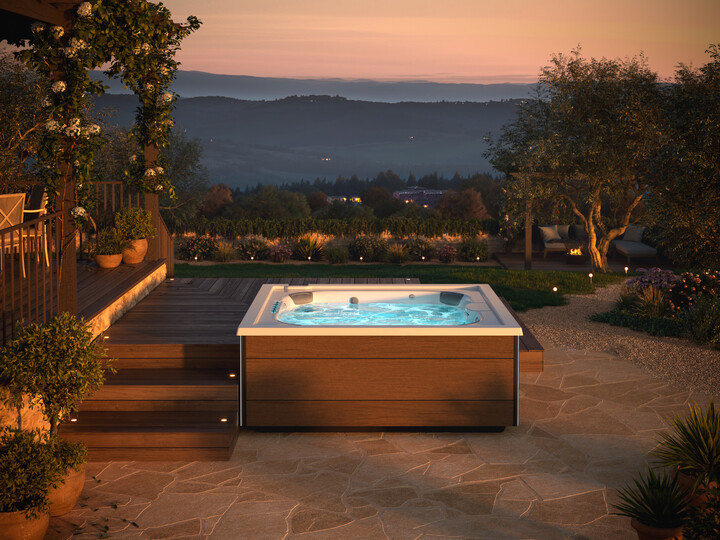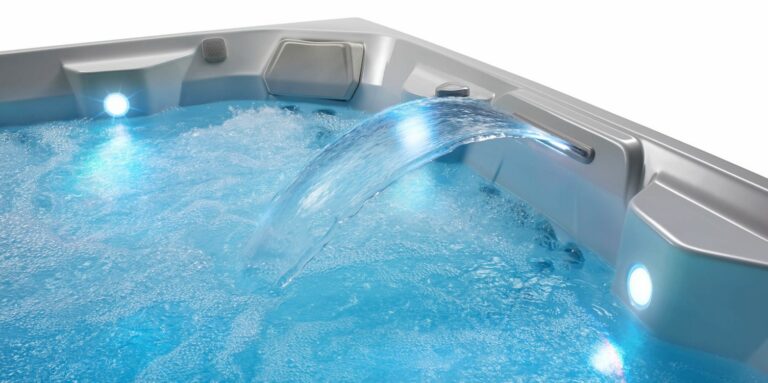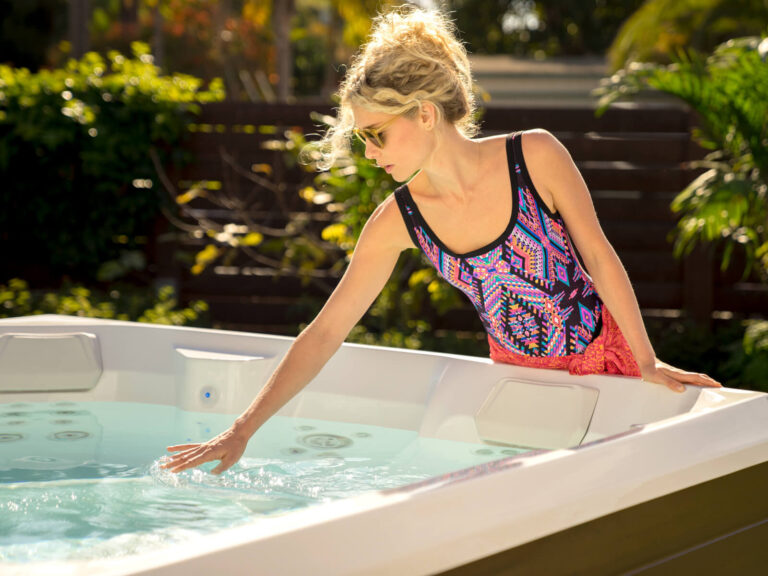Heat, pressure, and a soothing cocoon of cascading bubbles. Does anything feel better than easing yourself into a warm spa?
A hot tub soak quiets your mind, calms your nerves, and instantly eases pain. The warmth of the water can also help relax tight, aching muscles and improve circulation.
Whether you’re struggling with anxiety, chronic pain, or just everyday stress, there’s no doubt that you can use your hot tub for stress and pain relief.
There’s increasing science to prove it. Warm, immersive hydrotherapy supports your entire physiological system with beneficial effects that long outlast your spa time.
Let’s take a closer look at how soaking in a spa can reduce stress and promote relaxation.
How Using a Hot Tub Can Ease Stress, Relieve Pain and Encourage Relaxation
There are a few reasons why soaking in your hot tub feels so good, but it generally comes down to the combination of heat, compression, and buoyant support, and how these sensations affect your body.
There’s an instant physical release when you slip into your hot tub. The spa’s water supports your weight, anxiety gets lapped away in the currents, and the warmth releases any tension or tightness.
The spa jets can physically pummel you into relaxation by massaging away at sore muscles, but there’s a little more to the effect.
Hot tubs calm your autonomic nervous system by balancing the sympathetic and parasympathetic systems. The sympathetic system drives the fight or flight syndrome, while the parasympathetic system promotes feelings of peace and calm.
When extended stress throws these systems out of balance, warm hydrotherapy can help your body normalize regulation. This balancing effect continues long after you’ve finished soaking for an ongoing restful state.
Hot tubs also expand your blood vessels and stimulate the release of endorphins, flooding your body with natural healing and feel-good chemicals.
A lengthy soak is a perfect way to relieve pain.
Muscle aches, spasms, joint pain, stiffness, and arthritis all benefit from the physical compression and warmth your spa provides.
This kind of hydrotherapy soothes the sensory nerves wrapping your body and helps moderate the way your brain interprets pain.
There’s also a pain-regulating physiological function known as the Gate Control Theory. As your nervous system sends different signals to the central nervous system, these signals meet a gate at the spinal cord. If there are enough faster, good-feeling signals, the brain will be unable to process the slower, more painful ones.
Hydrotherapy’s temperature and pressure stimulation release enough endorphins and other pleasurable signals to block pain-related nerve information from traveling along the neuron fibers.
Simply put, spending time in the hot tub floods your body with so much pleasure it can’t really process anything else.
Your At-Home Wellness and Relaxation Center
Sinking into the buoyancy of a hot tub is one of the best ways to ease stress, relieve your pain, and promote relaxation.
Spas should be used regularly to gain the rewards of your investment. If you’re only taking a quick dip here and there, you’ll be missing out on the full health benefits they can bring.
Make your hot tub a private retreat that you visit regularly. A daily hot tub soak is perfectly safe but try to get in at least 2-3 times per week for optimal health.
20 to 25-minutes is all the time you need in your spa. You can stay in for longer if you like, but around 25 minutes will give you all the health benefits.
Your hot tub doesn’t need to be blazing hot! A gentle warmth will suffice and be more tolerable for extended bathing times.
Keeping your spa at a temperature range of 94° to 102° F is best. 102° is ideal if you’d like to be precise. Heating your hot tub above this is fine for a quick dip, but a little too toasty for extended soaking. Always keep your hot tub below 104° F.
Your spa’s soothing bubbles, dancing light, and water fountains create a relaxing ambiance on its own. If you want to enhance your hydrotherapy, you can bring in music and aromatherapy.
You can turn your hot tub into your own aromatherapy center with spa-friendly scented oils and salts. You can’t use essential oils or Epsom salts in hot tubs. Look for products that are specifically designed for hot tubs. Some manufacturers, like Jacuzzi, make their own blends.
Some hot tubs, like Jacuzzis, Calderas, and Hot Spring Spas, are available with audio systems. With speakers cradled around your headrest, you can stream your favorite playlist and nestle in for an enveloping audio experience.
How does a hot tub movie night sound? Many spa models can be turned into full-fledged entertainment systems. Some Jacuzzi and Caldera models have optional television accessories that are set up right on the side.
If your hot tub model doesn’t include a television, a contractor can easily create an outdoor entertainment space beside it.
Family night, party night, date night? It’s up to you. And imagine the resale value.
When it’s time for solo recuperation, one of the best ways to relax in your spa is with a good book. Yes, you can read in a hot tub. Just tuck your book into a floating book holder, use a waterproof e-reader, or play an audiobook and listen with your eyes closed.
To unwind from a particularly stressful day, indulge in some water-enhanced meditation and deep breathing exercises.
The water’s gentle compression on its own will slow your breathing down and place you in a more mindful state. But consciously bringing attention and awareness to your breath will take you deeper into this relaxation.
Breathe deeply into your lungs, feeling your chest expand against the water. You can place your attention on the swirling bubbles around you, the rhythmic pulse of the jets, or shift from focusing on the surrounding noise to the water and back again.
There’s no need to strictly count breaths in order to meditate. Holding a loose awareness will suffice.
You can bump up your fitness with your hot tub.
Using your hot tub as a pre-exercise warmup tool will help prevent injuries. And slipping in a few stretches, yoga moves, or Pilates after a spa session is an easy way to stay limber.
You can even do a few stretches or yoga moves while in the tub, using the water’s buoyancy to assist.
Heat therapy is good anytime you want to promote blood flow, relax your body, and loosen things up. Have a spa session when your muscles or joints are tight or sore, or when old injuries are flaring up.
Contrast Hydrotherapy
If you’re brave enough, use your hot tub for some classic contrast hydrotherapy. Take a cold shower or dip before you get into the spa, with the water as brisk as you can stand it.
If it’s winter and you have nature at hand, roll around in the snow or plunge yourself into an outdoor lake. Try going from cold to hot as many times as you can handle it.
Use your spa as often as you like and how you like. Just remember to drink plenty of water before and after your soak.
Use Your Hot Tub For Stress Relief & Improve Your Quality of Life
Stress and tension aren’t inherently bad. Even a little pain is good when the body needs to heal. These states help us focus, concentrate our energies, and perform better when stakes are high.
But the body needs to move on when the moment is over. You may not notice when stress, tension, and pain begin to linger, but these chronic states are extremely damaging all the same.
Chronic stress impairs your entire system. Your musculoskeletal system tightens and constricts, breathing gets shallower, circulatory processes intensify, gut function deteriorates, and hormones go awry.
Unresolved stress doesn’t just take years off your life, it dampens your overall living quality with increased anxiety, more fatigue, lower motivation, and poor moods.
Mental performance is severely impaired when you’re tense or under stress. Your ability to evaluate plummets and decision-making becomes more reactionary, with a tendency to prefer riskier choices as long as there’s a potentially high or immediate reward.
Daily stress, aches and pains, and tension need to be released on an ongoing basis. If not, you may find yourself engaging in unhealthy habits.
Stress brings unconscious coping methods, as your body tries to cope with less energy and find easy dopamine hits. You may reach for saltier foods, chocolate, or wine, or feel a general sense of lethargy that prevents you from exercising.
A gentle soak is one of the healthiest things you can do for yourself. Immersive hydrotherapy can naturally alleviate pain, anxiety, and tension without the risks or potential side effects of pharmaceuticals.
It will leave you sleeping better, more focused, and less run-down. Less stress means better thinking, reasoning, and decision-making. As your immune system improves, you may find yourself feeling less run-down and falling sick less often.
And you don’t need to work up any motivation to let the warm water caress your cares away. Go ahead and let your hot tub pummel away at those daily aches and pains before they develop into chronic pain.
Hydrotherapy For Life
Stress relief, pain relief, and relaxation might be the wellness trifecta, but hot tub hydrotherapy brings a host of other benefits, from improved sleep to better skin.
- Exercise isn’t the only way to improve your cardiovascular fitness. Spending even ten minutes in a hot tub will lower high blood pressure and promote good blood flow.
- Warm hydrotherapy can be beneficial for managing type 2 diabetes, improving insulin sensitivity and balancing blood glucose levels.
- An hour in your hot tub can burn around the same number of calories as a half-hour walk.
- Hot tub soaking can relieve fibromyalgia symptoms by soothing the body’s nerve endings, easing tension, and supporting the musculoskeletal system.
- Your body is wrapped in a gentle embrace that supports your joints while the heat lowers inflammation. These effects last long beyond your spa time.
- Hydrotherapy supports deeper, more high-quality sleep and rest.
- Hydrotherapy can relieve migraines and headaches since it dilates the blood vessels in your neck and brain.
- The water’s slight compression and steam gently improve your lung strength, health, and breathing capacity.
- Your hot tub’s steam is exceptionally good for your skin as it opens up the pores and brings fresh blood flow to the surface. Your skin will be purified and nourished as you soak, leaving you with a glowing, radiant complexion.
- Spending spa time with a loved one fosters closeness and is an excellent way to bond.
- You can biohack your way to falling asleep by raising your body temperature in your hot tub.
- Your spa is an excellent overall detox center. Raising your body temperature, fostering good circulation, opening pores, and flushing out sweat primes your body to rid itself of toxins.
- Hot tub hydrotherapy generates endorphins and wellness-supporting biochemicals. If you’re feeling blue, just get into the tub.
- Warm hydrotherapy limbers you up by reducing inflammation, massaging your muscles, and easing mental anxiety.
- Hot tubs are great for your brain. The warmth opens up small blood vessels in the brain, preventing micro-deterioration.
- Regular hot tub sessions make your arteries more flexible and support your cardiovascular system.
Supporting your body with the soothing embrace of immersive hydrotherapy is one of the best things you can do for holistic health.
Explore Hot Tubs and Spas Today
Are you looking for a hot tub that can support your health and wellness?
Talk to our leading outdoor spa experts. We’ll help you find you the best hot tub for stress and pain relief that will compliment your living space and fit your needs. We carry a comprehensive range that can suit any budget or price point.
If you aren’t ready to speak to someone yet, get inspired by our outdoor living space galleries. Or narrow down your options with our dream hot tub finder.
We have over 35 years of experience satisfying customers across Southern California. Contact us now to find the best hot tub for you.




